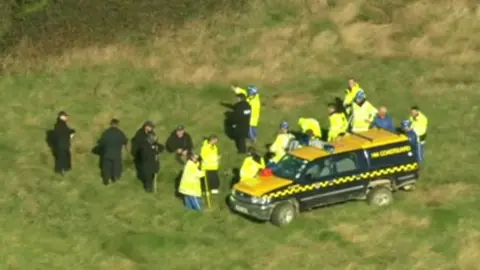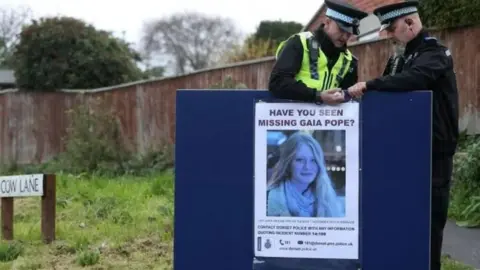Gaia Pope: New BBC documentary set to explore teen's death
A new BBC documentary is set to be released about the circumstances that led to the death of teenager Gaia Pope.
The 19-year-old was found dead 11 days after she went missing in Swanage, Dorset, in 2017, having been diagnosed with post-traumatic stress disorder.
It followed an allegation she made about being raped by a man when she was 16, which was not pursued by police.
Gaia: A Death on Dancing Ledge will see Zara McDermott exploring whether officials did enough to support her.
It will air on BBC Three and BBC iPlayer on 25 July.

Miss Pope's family said they wanted "young people and survivors" watching the documentary to know that "they are not alone".
"Our hearts ache thinking about everything she was and all the possibilities of what she could have become," they said.
They hope to "eliminate the perpetuation of rape culture in society" as well as holding "the authorities that are meant to protect us to account".
The documentary will track the events leading up to Miss Pope's death and explore the "failings and oversights" by police and health care professionals involved in her care.
"With the release of this series, we're clinging on to the hope that we can be part of the change Gaia so desperately needed," the family added.

Timeline of disappearance
December 2015: Gaia Pope reports being raped to Dorset Police.
June 2016: The force tells Miss Pope the man she accused will not be charged.
February 2017: Miss Pope is sectioned under the Mental Health Act.
April 2017: The man she accused is jailed for unrelated sex offences.
October 2017: Miss Pope is admitted to hospital after suffering a manic episode. She is discharged and not sectioned.
November 2017: Miss Pope learns the man she accused is being released. She goes missing and is found dead 11 days later.

Miss Pope's health had been deteriorating as she began experiencing worsening epileptic seizures and psychosis.
But after an admission to Poole Hospital a fortnight before her death, psychiatrist Dr Peter Jeffery chose not to section her, nor did he refer her to the mental health crisis team - decisions that he "regrets".
On the day she disappeared Miss Pope was feeling anxious after being told of her alleged rapist's release from prison for other sex offences.
Her body was found in undergrowth near a clifftop path between Dancing Ledge and Anvil Point on 18 November 2017.
A post-mortem examination revealed she died of hypothermia.
 PA Media
PA MediaThe family also feels let down by Dorset Police, both before and after reporting her missing.
Miss Pope's twin sister, Maya, previously told the BBC she was "repulsed and sickened" by their "amateurish mistakes".
As part of the family's Justice for Gaia campaign, the family are demanding changes including improved funding for mental health services and the creation of a specialist unit dedicated to investigating rape and sexual offences across all police forces in the UK.
The documentary is the first time that Miss Pope's story has been pieced together in full for a TV audience.

The series will be fronted by TV presenter and Love Island star Zara McDermott.
Ms McDermott said she was "immediately struck by her story".
"A young woman with the world at her feet, yet her life was over before it had even begun," she said.
She added: "I began diving deeper into Gaia's story, alongside her brave family, and I uncovered a huge amount in the year and a half I spent down in Dorset.
"This young woman needed a voice, and I wanted to tell her story."
Following the inquest, Dorset Police said it was "truly sorry" Miss Pope and her family did not receive better treatment in the 48 hours following her disappearance.
The force said it recognised it "should have done much better" in dealing with the case.
It said it had since worked to "ensure we have the right framework in place so we can respond promptly and effectively when someone is reported missing".

Follow BBC South on Facebook, Twitter, or Instagram. Send your story ideas to [email protected].
